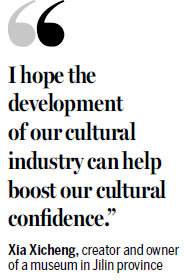Private museums helping to preserve heritage
CHANGCHUN - Xia Xicheng has plowed a lot of money into his museum, but to him, the treasures it now holds are priceless.
Xia, 68, is the creator and owner of a museum in the city of Hunchun in Northeast China's Jilin province.
Featuring more than 140,000 exhibits covering a vast 35,000 square meter exhibition space, Xia's museum breathes life and brings color back to ancient Chinese artifacts, items from folk and ethnic culture, objects from revolutionary times, and exhibits that piece together the history of Hunchun.
Xia has collected or bought all the items himself over the past 50 years.
"When I was young, I applied to join the People's Liberation Army, but didn't pass the test. I have this fondness for military life, and that's why I love PLA-themed collections," Xia said.
"The unique culture of Hunchun also mesmerizes me."
Xia's museum features numerous artifacts and tools which were once used by local ethnic groups in their communities, and he has even built several examples of traditional ethnic architecture inside the museum itself.

Private museums are gaining momentum in China.
According to data published by the State Administration of Cultural Heritage in January, China had a total of 4,826 museums at the end of 2016, of which 1,266 were privately owned and operated. Jilin province has 14 private museums.
Private museums can play important roles in exhibiting and preserving cultural heritage and can be a good supplement to public museums, according to Lu Jiansong, head of the department of cultural heritage and museology at Shanghai-based Fudan University.
However, running a private museum is not so easy.
For Xia, a successful entrepreneur, money is not a problem. But most of his family and friends discouraged him when he first had the idea to build his own museum.
"They all thought I was crazy," Xia said. "They told me if the hundreds of millions of yuan were invested elsewhere, the profits would be respectable."
But Xia continued with his museum project anyway. Making money is not the point, Xia said. "Now after seeing my museum, they can finally understand me."
In July 2017, SACH issued a set of guidelines to facilitate the development of private museums, pledging better financial support and favorable taxation.
Xia, who also holds a position as a local lawmaker, has been proposing measures to facilitate the development of the local tourism and cultural industry.
"Culture is the soul of a city and a country. I hope the development of our cultural industry can help boost our cultural confidence," he said.
Xinhua
(China Daily 05/31/2018 page17)














